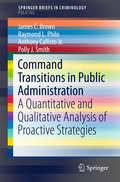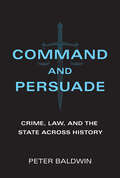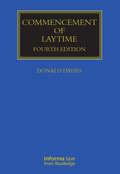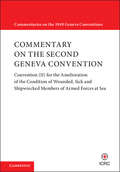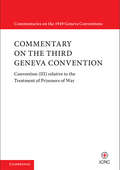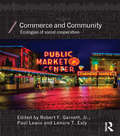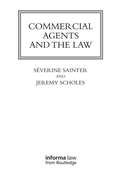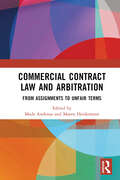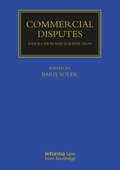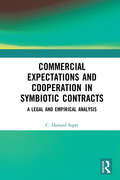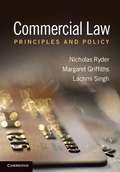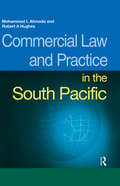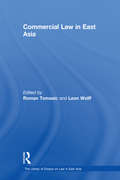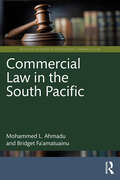- Table View
- List View
Coming Out From Behind The Badge: The People, Events, and History that shape our Journey
by Greg MiragliaThis book is intended to support lesbian, gay, bisexual, and transgender (LGBT) law enforcement professionals who are seeking a way to "come out" and be successful on the job. It is also intended to educate heterosexuals (persons attracted to the opposite sex) and cisgender people (persons who identify their gender in a way that is consistent with their birth sex) to better understand differences in sexual orientation and gender identity and how to support their colleagues. In addition, this edition was written to support students who are preparing for a career in law enforcement and those already in the field seeking a better understanding of a large segment of the community which law enforcement serves.
Coming Out of the Magnolia Closet: Same-Sex Couples in Mississippi
by John F. Marszalek III2020 Digital Book World Best Book (Published by a University Press)In Coming Out of the Magnolia Closet: Same-Sex Couples in Mississippi, John F. Marszalek III shares conversations with same-sex couples living in small-town and rural Mississippi. In the first book of its kind to focus on Mississippi, couples tell their stories of how they met and fell in love, their decisions on whether or not to marry, and their experiences as sexual minorities with their neighbors, families, and churches. Their stories illuminate a complicated relationship between many same-sex couples and their communities, influenced by southern culture, religion, and family norms.As Marszalek guides readers into the homes of diverse same-sex couples, he weaves in his own story of meeting his husband and living as a married gay man in Mississippi. Both the couples and he explain why they remain in one of the most conservative states in the country rather than moving to a place with a large, vibrant gay community. In addition to sharing his own experiences, Marszalek reviews the literature on the topic, including writings from southern and rural queer studies, history, sociology, and psychology, to explain how the couples’ relationships and experiences compare to those of same-sex couples in other areas and times. Consequently, Coming Out of the Magnolia Closet is written for both the scholar of southern and queer studies and for anyone interested in learning about the experiences of same-sex couples.
Coming of Age in Nineteenth-Century India
by Ruby LalIn this engaging and eloquent history, Ruby Lal traces the becoming of nineteenth-century Indian women through a critique of narratives of linear transition from girlhood to womanhood. In the north Indian patriarchal environment, women's lives were dominated by the expectations of the male universal, articulated most clearly in household chores and domestic duties. The author argues that girls and women in the early nineteenth century experienced freedoms, eroticism, adventurousness and playfulness, even within restrictive circumstances. Although women in the colonial world of the later nineteenth century continued to be agential figures, their activities came to be constrained by more firmly entrenched domestic norms. Lal skillfully marks the subtle and complex alterations in the multifaceted female subject in a variety of nineteenth-century discourses, which are elaborated in four different sites - forest, school, household, and rooftop.
Coming to Jakarta: A Poem about Terror
by Peter Dale Scott"Not since Robert Duncan's Ground Work and before that William Carlos Williams' Paterson has New Directions published a long poem as important as Coming to Jakarta!" —James Laughlin A devastating revelation of violence, exploitation, and corrupt politics, Coming to Jakarta derives its title from the role played by the CIA, banks, and oil companies in the 1965 slaughter of more than half a million Indonesians. A former Canadian diplomat and now a scholar at the University of California, Peter Dale Scott has said that the poem "is triggered by what we know of the bloody Indonesian massacre… However it is not so much a narrative of exotic foreign murder as one person’s account of what it is like to live in the 20th century, possessing enough access to information and power to feel guilty about global human oppression, but not enough to deal with it. The usual result is a kind of daily schizophrenia by which we desensitize ourselves to our own responses to what we read in the newspapers. The psychic self-alienation which ensues makes integrative poetry difficult but necessary." With a brilliant use of collage, placing the political against the personal––childhood acquaintances are among the darkly powerful figures––Scott works in the tradition of Pound’s Cantos, but his substance is completely his own.
Command Transitions in Public Administration: A Quantitative and Qualitative Analysis of Proactive Strategies (SpringerBriefs in Criminology)
by James C. Brown Raymond L. Philo Anthony Callisto Jr. Polly J. SmithThis Brief provides a quantitative and qualitative analysis of proactive strategies for management transitions in criminal justice and other public administration civic service agencies. These organizations have a unique need for managing transitions effectively. Compared to private organizations: they have a relatively high frequency of management transitions due to the terms of elected and appointed officials, and these new managers more often come from outside the organization. Through an mixed-methods study of criminal justice command level staff in New York state, researchers found a number of key components to successful transitions. Based on their study, the researchers prepared a set of guidelines called the Command Transition Matrix. This tool is aimed at police and public administration leadership. The methodology used to develop it will be of interest to researchers in Criminal Justice Administration, Public Policy, and Management Science.
Command and Persuade: Crime, Law, and the State across History
by Peter BaldwinWhy, when we have been largely socialized into good behavior, are there more laws that govern our behavior than ever before?Levels of violent crime have been in a steady decline for centuries--for millennia, even. Over the past five hundred years, homicide rates have decreased a hundred-fold. We live in a time that is more orderly and peaceful than ever before in human history. Why, then, does fear of crime dominate modern politics? Why, when we have been largely socialized into good behavior, are there more laws that govern our behavior than ever before? In Command and Persuade, Peter Baldwin examines the evolution of the state's role in crime and punishment over three thousand years. Baldwin explains that the involvement of the state in law enforcement and crime prevention is relatively recent. In ancient Greece, those struck by lightning were assumed to have been punished by Zeus. In the Hebrew Bible, God was judge, jury, and prosecutor when Cain killed Abel. As the state&’s power as lawgiver grew, more laws governed behavior than ever before; the sum total of prohibited behavior has grown continuously. At the same time, as family, community, and church exerted their influences, we have become better behaved and more law-abiding. Even as the state stands as the socializer of last resort, it also defines through law the terrain on which we are schooled into acceptable behavior.
Commander in Cheat: How Golf Explains Trump
by Rick ReillyAn outrageous indictment of Donald Trump's appalling behavior when it comes to golf -- on and off the green -- and what it reveals about his character. <P><P> Donald Trump loves golf. He loves to play it, buy it, build it, and operate it. He owns 14 courses around the world and runs another five, all of which he insists are the best on the planet. He also claims he's a 3 handicap, almost never loses, and has won an astonishing 18 club championships. How much of all that is true? Almost none of it, acclaimed sportswriter Rick Reilly reveals in this unsparing look at Trump in the world of golf. <P><P>Base on Reilly's own experiences with Trump as well as interviews with over 100 golf pros, amateurs, developers, and caddies, Commander in Cheat is a startling and at times hilarious indictment of Trump and his golf game. <P><P>You'll learn how Trump cheats (sometimes with the help of his caddies and Secret Service agents), lies about his scores (the "Trump Bump"), tells whoppers about the rank of his courses and their worth (declaring that every one of them is worth $50 million), and tramples the etiquette of the game (driving on greens doesn't help). Trump doesn't brag so much, though, about the golf contractors he stiffs, the course neighbors he intimidates, or the way his golf decisions wind up infecting his political ones. <P><P>For Trump, it's always about winning. To do it, he uses the tricks he picked up from the hustlers at the public course where he learned the game as a college kid, and then polished as one of the most bombastic businessmen of our time. As Reilly writes, "Golf is like bicycle shorts. It reveals a lot about a man." Commander in Cheat "paints a side-splitting portrait of a congenital cheater" (Esquire), revealing all kinds of unsightly truths Trump has been hiding. <P><b>A New York Times Bestseller</b>
Commencement of Laytime (Maritime and Transport Law Library)
by Davies DonaldCommencement of Laytime is the only in-depth examination and discussion concerning the most important financial aspect of laytime which can affect all voyage charter parties and international contracts for the sale of goods. The information is presented in a style which is readable by ship operators, traders and other lay persons as well as legal professionals.
Comment Sauver son Mariage: éviter un divorce et renforcer sa relation de couple
by Kathleen WatersContenu du livre : Êtes-vous confronté à des problèmes graves dans votre vie de couple pouvant résulter à un divorce ? Si la réponse est oui, eh bien, ce guide est fait pour vous. Il changera votre vie et sauvera votre mariage. Si vous estimez que vous avez des progrès à faire dans votre mariage et que vous êtes conscient de la peine que votre conjoint et vous ou vos enfants pourrez ressentir si vous venez à vous séparer, cela veut dire que vous avez besoin d’aide ! Fort de techniques utilisées durant des dizaines d’années, ce livre électronique vous montrera la méthode efficace pour sauver votre relation et profiter du bien-être de votre conjoint et de vos proches ! Ce qu’il contient : - Entretenir de bons rapports avec votre moitié - Méthode efficace pour sauver votre mariage. - Bénéficier à toute votre famille et vos enfants. - Contribuer à vous rendre plus heureux et vous sentir bien. + PLUS ENCORE ! Si vous désirez améliorer et/ou sauver votre mariage, ce guide est fait pour vous. --> Revenez sur le haut de la page et cliquer sur ajouter dans le panier pour acquérir cet ouvrage à l’instant Avis de non-responsabilité: L’auteur de cet ouvrage ou toute personne en possédant des droits ne peuvent garantir ou certifier de l'efficacité des conseils et ne seront en aucun cas rendus responsables des éventuelles erreurs ou omissions contenues dans ce livre. Cet ouvrage sert uniquement de référence. Bien vouloir consulter un spécialiste avant d’expérimenter un conseil contenu dans cet ouvrage.
Comment Vous Remettre de Votre Divorce: le guide pour oublier votre ex-conjoint et vous ouvrir à de nouvelles relations
by Steve MartinDivorcer peut apparaître comme une étape insurmontable. Pourtant, il existe chez chacun de nous des ressources qui nous permettent de traverser un processus de guérison salutaire. En gérant vos émotions, vous pourrez apprendre à rester centré sur ce qui est réellement important. Découvrez grâce à ce guide, les étapes élémentaires pour gérer cette période avec sagesse, raison et efficacité !
Commentary on Thomas Aquinas's Treatise on Law
by J. BudziszewskiNatural moral law stands at the center of Western ethics and jurisprudence and plays a leading role in interreligious dialogue. Although the greatest source of the classical natural law tradition is Thomas Aquinas' Treatise on Law, the Treatise is notoriously difficult, especially for nonspecialists. J. Budziszewski has made this formidable work luminous. This book - the first classically styled, line by line commentary on the Treatise in centuries - reaches out to philosophers, theologians, social scientists, students, and general readers alike. Budziszewski shows how the Treatise facilitates a dialogue between author and reader. Explaining and expanding upon the text in light of modern philosophical developments, he expounds this work of the great thinker not by diminishing his reasoning, but by amplifying it.
Commentary on the First Geneva Convention: Convention (I) for the Amelioration of the Condition of the Wounded and Sick in Armed Forces in the Field (Commentaries on the 1949 Geneva Conventions)
by Michael Meyer Lindsey Cameron Knut Dörmann Bruno Demeyere Iris Müller Jean-Marie Henckaerts Heike Niebergall-Lackner Tristan Ferraro Eve La Haye Cordula Droege Robin Geiss Laurent Gisel François Bugnion Sylvain Vité Helen Durham Sandesh Sivakumaran Alexander Breitegger Jann K. Kleffner Geoffrey S. Corn Dana Constantin Stephan Michel Claude SchenkerThe application and interpretation of the four Geneva Conventions of 1949 and their two Additional Protocols of 1977 have developed significantly in the sixty years since the International Committee of the Red Cross (ICRC) first published its Commentaries on these important humanitarian treaties. To promote a better understanding of, and respect for, this body of law, the ICRC commissioned a comprehensive update of its original Commentaries. Its preparation was coordinated by Jean-Marie Henckaerts, ICRC legal adviser and head of the project to update the Commentaries. The First Convention is a foundational text of international humanitarian law. It contains the essential rules on the protection of the wounded and sick, those assigned to their care, and the red cross and red crescent emblems. This article-by-article Commentary takes into account developments in the law and practice to provide up-to-date interpretations of the Convention. The new Commentary has been reviewed by humanitarian-law practitioners and academics from around the world. It is an essential tool for anyone working or studying within this field. An article-by-article Commentary on the First Geneva Convention and Additional Protocols issued by the International Committee of the Red Cross, capturing contemporary developments in their application and interpretation. Contains thorough and up-to-date interpretations from an extensive process involving both International Committee of the Red Cross and external contributors, as well as peer review by academics and international humanitarian law practitioners, ensuring coherent content while accurately reflecting diverging views. Provides practitioners and scholars with easy access to comprehensive, high-quality legal information.
Commentary on the Second Geneva Convention: Convention (II) for the Amelioration of the Condition of Wounded, Sick and Shipwrecked Members of Armed Forces at Sea (Commentaries on the 1949 Geneva Conventions)
by Lindsey Cameron Eve Knut Dörmann Liesbeth Lijnzaad Marco Sassòli Bruno Demeyere La Haye Heike Philip Spoerri Niebergall-Lackner Jean-Marie HenckaertsThe application and interpretation of the four Geneva Conventions of 1949 have developed significantly in the sixty years since the International Committee of the Red Cross (ICRC) first published its Commentaries on these important humanitarian treaties. To promote a better understanding of, and respect for, this body of law, the ICRC commissioned a comprehensive update of its original Commentaries, of which this is the second volume. Its preparation was coordinated by Jean-Marie Henckaerts, ICRC legal adviser and head of the project to update the Commentaries. The Second Convention is a key text of international humanitarian law. It contains the essential rules on the protection of the wounded, sick and shipwrecked at sea, those assigned to their care, and the vessels used for their treatment and evacuation. This article-by-article Commentary takes into account developments in the law and practice to provide up-to-date interpretations of the Convention. The new Commentary has been reviewed by humanitarian-law practitioners and academics from around the world, including naval experts. It is an essential tool for anyone working or studying within this field. The second installment in a series of article-by-article commentaries on the Second Geneva Convention and Additional Protocols issued by the International Committee of the Red Cross, capturing contemporary developments in their application and interpretation. Contains thorough and up-to-date interpretations from an extensive process involving both the International Committee of the Red Cross and external contributors, as well as peer review by academics and international humanitarian law practitioners, ensuring coherent content while accurately reflecting diverging views. Provides practitioners and scholars with easy access to comprehensive, high-quality legal information.
Commentary on the Third Geneva Convention: Convention (III) relative to the Treatment of Prisoners of War (Commentaries on the 1949 Geneva Conventions)
by International Committee of the Red CrossThe application and interpretation of the four Geneva Conventions of 1949 and their two Additional Protocols of 1977 have developed significantly in the seventy years since the International Committee of the Red Cross (ICRC) first published its Commentaries on these important humanitarian treaties. To promote a better understanding of, and respect for, this body of law, the ICRC commissioned a comprehensive update of its original Commentaries, of which this is the third volume. The Third Convention, relative to the treatment of prisoners of war and their protections, takes into account developments in the law and practice in the past seven decades to provide up-to-date interpretations of the Convention. The new Commentary has been reviewed by humanitarian law practitioners and academics from around the world. This new Commentary will be an essential tool for anyone involved with international humanitarian law.
Commerce and Community: Ecologies of Social Cooperation (Economics as Social Theory)
by Paul Lewis Robert F. Garnett Lenore T. EalySince the end of the Cold War, the human face of economics has gained renewed visibility and generated new conversations among economists and other social theorists. The monistic, mechanical "economic systems" that characterized the capitalism vs. socialism debates of the mid-twentieth century have given way to pluralistic ecologies of economic provisioning in which complexly constituted agents cooperate via heterogeneous forms of production and exchange. Through the lenses of multiple disciplines, this book examines how this pluralistic turn in economic thinking bears upon the venerable social–theoretical division of cooperative activity into separate spheres of impersonal Gesellschaft (commerce) and ethically thick Gemeinschaft (community). Drawing resources from diverse disciplinary and philosophical traditions, these essays offer fresh, critical appraisals of the Gemeinschaft / Gesellschaft segregation of face-to-face community from impersonal commerce. Some authors issue urgent calls to transcend this dualism, whilst others propose to recast it in more nuanced ways or affirm the importance of treating impersonal and personal cooperation as ethically, epistemically, and economically separate worlds. Yet even in their disagreements, our contributors paint the process of voluntary cooperation – the space commerce and community – with uncommon color and nuance by traversing the boundaries that once separated the thin sociality of economics (as science of commerce) from the thick sociality of sociology and anthropology (as sciences of community). This book facilitates critical exchange among economists, philosophers, sociologists, anthropologists, and other social theorists by exploring the overlapping notions of cooperation, rationality, identity, reciprocity, trust, and exchange that emerge from multiple analytic traditions within and across their respective disciplines.
Commercial Agents and the Law (Lloyd's Commercial Law Library)
by Séverine Saintier Jeremy ScholesCommercial Agents and the Law is a practical approach to the modern law relating to commercial agency agreements, a complete guide to the workings of the relationship between commercial agents and their principal within its domestic and European context. This book is a complete guide to the workings of the relationship between commercial agents and their principal within its domestic and European context. The common law rules governing the relationship between principal and agent were pretty well established and well understood by English lawyers when, in 1993, the Commercial Agents (Council Directive) Regulations were enacted. The 1993 Regulations implement EC Directive 86/653 on self-employed commercial agents. The 1993 Regulations, like the EC Directives, are not, however, a complete code of rules governing the relationship, so they have to co-exist with the pre-existing common law rules. Both sets of principles therefore have to be applied.
Commercial Contract Law
by Larry A. DiMatteo Qi Zhou Séverine Saintier Keith Rowley Larry A. Dimatteo Qi Zhou Séverine SaintierThis book focuses on the law of commercial contracts as constructed by the U. S. and UK legal systems. Leading scholars from both sides of the Atlantic provide works of original scholarship focusing on current debates and trends from the two dominant common law systems. The chapters approach the subject areas from a variety of perspectives - doctrinal analysis, law and economic analysis, and social-legal studies, as well as other theoretical perspectives. The book covers the major themes that underlie the key debates relating to commercial contract law: role of consent; normative theories of contract law; contract design and good faith; implied terms and interpretation; policing contract behavior; misrepresentation, breach, and remedies; and the regional and international harmonization of contract law. Contributors provide insights on the many commonalities, but more interestingly, on the key divergences of the United States and United Kingdom's approaches to numerous areas of contract law. Such a comparative analysis provides a basis for future developments and improvements of commercial contract law in both countries, as well as other countries that are members of the common law systems. At the same time, insights gathered here should also be of interest to scholars and practitioners of the civil law tradition.
Commercial Contract Law and Arbitration: From Assignments to Unfair Terms
by Mads Andenas Maren HeidemannThis book tackles one of the most challenging fields of research and practice in the current global trade environment: integrating doctrines of private and public law for the purpose of international commerce and trade.Traditional concepts of obligatory and proprietary claims and rights reach their limits when placed within an international context of litigation funding, liability and securitisation. Across disciplines, scholars and practitioners are seeking new ways of expanding and reconnecting novel products and services such as data; and the use of international dispute settlement with indispensable constitutional values and democratic processes is also growing. This book combines contributions on current issues in commercial contract and contract law, making an important contribution to the areas of substantive contract law and arbitration procedure that connect issues across disciplines. Exploring both substantive and procedural laws, the book explores unfair terms in non-consumer contracts, which is complemented by a broader contextual discussion of the regulation of platform operators in the European Union; while a discussion of the procedural role of public reporting of investment arbitration awards by the International Centre for the Settlement of Investment Disputes (ICSID) expands on the procedural aspects of arbitration within the wider context of the rule of law debate.Debating policy issues in general private law reform, and including a juxtaposition of a traditionalist continuation-oriented approach and a call for radical reform of entrenched and outmoded private law concepts to suit global commerce, this book will be of interest to students, academics and practitioners working in the area of commercial contract law and arbitration.
Commercial Disputes: Resolution and Jurisdiction (Maritime and Transport Law Library)
by Andrew Tettenborn George Leloudas Bariş SoyerRemedies are vital in commercial litigation. Additionally, in commercial law, parties are usually free to choose the forum and law that will govern their disputes. This book aims to shine the spotlight on these issues and look to several new trends and developments emerging on procedural matters relating to dispute resolution. The discussions range freely over national, international, and EU legal dimensions, and the book also comes at an opportune time, with the post-Brexit jurisdiction landscape becoming more definable.This edited volume presents contributions from highly expert and experienced academics and practitioners, collectively examining a broad range of areas relating to the complex and time-consuming issues of resolution and jurisdiction of commercial disputes. The book is divided into three parts: arbitration and ADR, jurisdiction and procedure, and choice of law. Key topics featured include summary procedures in London Maritime Arbitration, reformation of the Arbitration Act, challenges to jurisdiction, stay of proceedings, anti-suit injunctions, the EU-UK judicial space post-Brexit, the application of AI to commercial disputes, and choice of law agreements.Written for lawyers and administrators not only in England and Wales but worldwide - especially Germany, Switzerland, Greece, Canada, Australia, New Zealand, China, Hong Kong, Singapore, and India – the book is also valuable for specialist law libraries in Europe and the US, some specialist maritime law firms in the US, and some university libraries where maritime and shipping law are taught as specialist subjects.
Commercial Expectations and Cooperation in Symbiotic Contracts: A Legal and Empirical Analysis
by Charles Haward SoperExploring the role played by cooperation in the law and management of modern, complex contracts, this book contrasts an in-depth review of case law with a large-scale empirical study of the views of commercial actors responsible for the outcomes of these contracts. The possibility of aligning these expectations with the law is considered from the perspective that there is a general duty for parties to cooperate and ensure constructive engagement. The book examines how this might translate into constructive communication, professional governance, genuine attempts to settle issues, a right to fix defects and a duty to take decisions in a fair and rational manner. It argues that statutory adjudication should be extended to all commercial contracts and more ambitious use of available remedies, including those for prevention and cost penalties, would help provide incentives for parties to cooperate more fully. The book will be of interest to academics in the fields of contract law and of contract management, as well as legal and commercial practitioners.
Commercial Law
by Lachmi Singh Margaret Griffiths Nicholas RyderThis innovative textbook examines commercial law and the social and political context in which it develops. Topical examples, such as funding for terrorism, demonstrate this fast-moving field's relevance to today's concerns. This wide-ranging subject is set within a clear structure, with part and chapter introductions setting out the student's course of study. Recommendations for further reading at the end of every chapter point the reader to important sources for advanced study and revision questions encourage understanding. The extensive coverage and detailed commentary has been extensively market tested to ensure that the contents are aligned with the needs of university courses in commercial law.
Commercial Law and Practice in the South Pacific (South Pacific Law)
by Robert Hughes Mohammed L. AhmaduCommerce has become an area of central importance to the South Pacific region. Although the countries are small it is widely acknowledged that their need to promote and develop commercial enterprise is crucial for their future sustainability. This new textbook is the first to examine the main areas of commercial law in the common law jurisdictions of the South Pacific region. These jurisdictions include the Cook Islands, Fiji Islands, Kiribati, Marshall Islands, Niue, Nauru, (Western) Samoa, Solomon Islands, Tonga, Tuvalu and Vanuatu. The text is divided into six parts each with its own introduction to aid the reader through each particular area. Utilising both a structural and transactional approach it examines: the establishment and termination of commercial organizations the internal and external relations within and between organizations the legal principles applicable to various kinds of commercial dealings eg. insurance, sale of goods, bills of exchange aspects of foreign trade and international commerce relevant to the region. Knowledge of the legal principles that regulate commercial activity within the South Pacific Region is essential for the communities themselves and for those from outside interested in doing business in the area. Students studying commercial law in the region will find this textbook essential reading as will those involved, or seeking to become involved, in commercial activity there
Commercial Law in East Asia (Law In East Asia Ser.)
by Roman Tomasic Leon WolffThe shift of economic gravity towards East Asia requires a critical examination of law's role in the Asian Century. This volume explores the diverse scholarly perspectives on law's role in the economic rise of East Asia and moves from general debates, such as whether law enjoys primacy over culture, state intervention or free markets in East Asian capitalism, to specific case studies looking at the nature of law in East Asian negotiations, contracts, trade policy and corporate governance. The collection of articles exposes the clefts and cleavages in the scholarly literature explaining law's form, function and future in the Asian Century.
Commercial Law in the South Pacific (Routledge Research in International Commercial Law)
by Mohammed L. Ahmadu Bridget Fa’amatuainuThis book provides a detailed examination of the core areas of commercial law in common law jurisdictions across a range of South Pacific countries: Cook Islands, Fiji Islands, Kiribati, Marshall Islands, Niue, Nauru, Samoa, Solomon Islands, Tonga, Tuvalu and Vanuatu.Commerce is an area of central importance to the South Pacific region. Although the countries in question are small it is widely acknowledged that their need to promote and develop commercial enterprise is crucial for their future sustainability. With a focus on case law and legislative provisions in individual jurisdictions, it sets out the framework of legal principles that regulate commercial activity within the South Pacific region, highlighting the common patterns and principal differences between countries of the region. It includes a discussion of PACER Plus, post-Cotonou discussions and the EU-OACPS Partnership Agreement as well as key amendments and challenges to commercial law in the region. It explores the legal structures of commerce, control and management of commercial entities, banking and transactions and termination. Importantly, the book has two new chapters, on digital currency and e-commerce in the South Pacific, reflecting the increasing use of technology in financial and commercial transactions.Offering a detailed analysis of the legal principles that regulate commercial activity within the South Pacific region, this book will be a useful resource for students, academics and practitioners working on commercial law in the South Pacific region.
Commercial Lawcards 2012-2013 (Lawcards)
by RoutledgeRoutledge Lawcards are your complete, pocket-sized guides to key examinable areas of the undergraduate law curriculum and the CPE/GDL. Their concise text, user-friendly layout and compact format make them an ideal revision aid. Helping you to identify, understand and commit to memory the salient points of each area of the law, shouldn’t you make Routledge Lawcards your essential revision companions? Fully updated and revised with all the most important recent legal developments, Routledge Lawcards are packed with features: Revision checklists help you to consolidate the key issues within each topic Colour coded highlighting really makes cases and legislation stand out Full tables of cases and legislation make for easy reference Boxed case notes pick out the cases that are most likely to come up in exams Diagrams and flowcharts clarify and condense complex and important topics '...an excellent starting point for any enthusiastic reviser. The books are concise and get right down to the nitty-gritty of each topic.' - Lex Magazine Routledge Lawcards are supported by a Companion Website offering: flashcard glossaries allowing you to test your understanding of key terms and definitions Multiple Choice Questions to test and consolidate your revision of each chapter Advice and tips to help you better plan your revision and prepare for your exams Titles in the Series: Commercial Law; Company Law; Constitutional Law; Contract Law; Criminal Law; Employment Law; English Legal System; European Union Law; Evidence; Equity and Trusts; Family Law; Human Rights; Intellectual Property Law; Jurisprudence; Land Law; Tort Law




